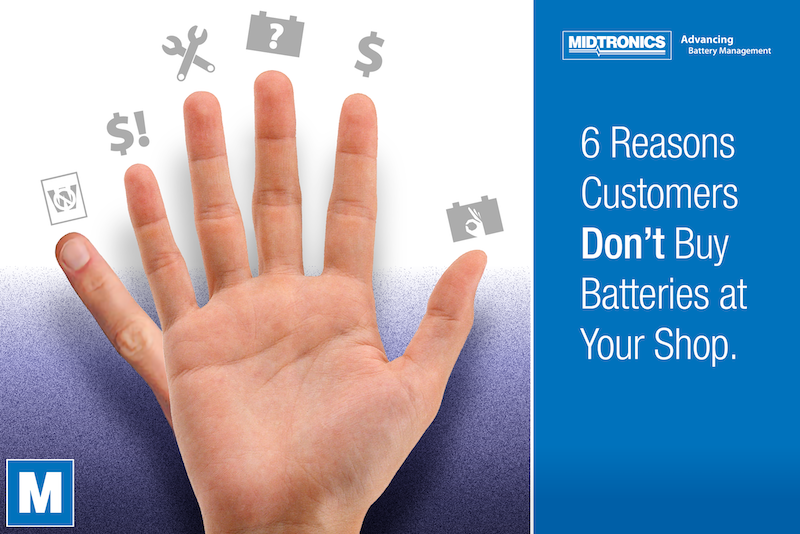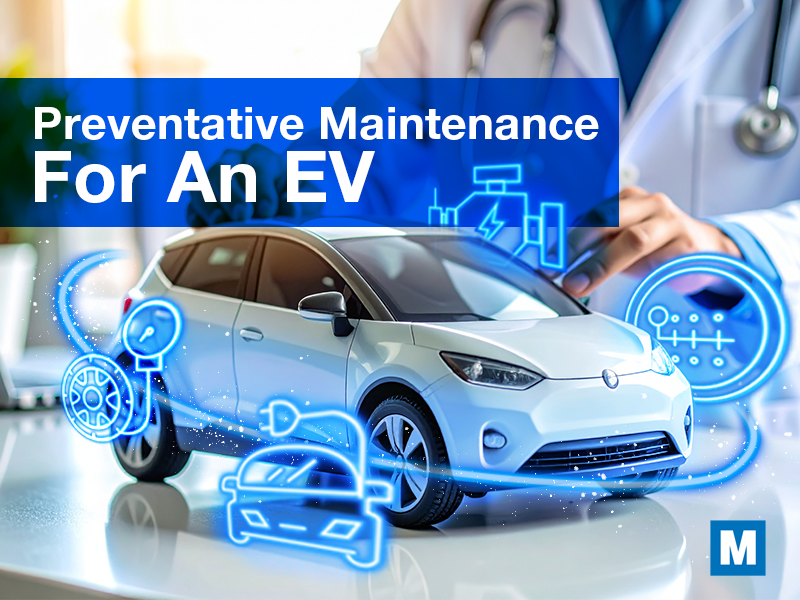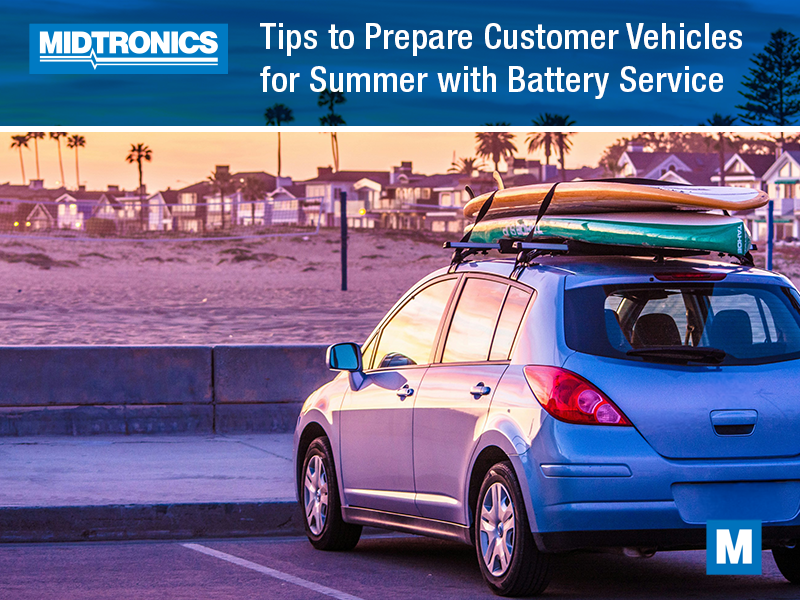For most drivers, their car battery needs to be replaced every three to five years. It’s usually an unexpected expense when it comes up, but nonetheless, it needs to be done. A bad battery will leave them frustrated, scrambling for their roadside assistance number or pleading with a neighbor or co-worker for a jumpstart. And in many of those cases, the vehicle owner already knows the battery needs to be replaced.
For service shops all over the country, this situation comes up. The battery has been tested by a technician, but the customer refuses the recommendation to replace the battery immediately. They end up driving away with a note on their work order that the battery is marginal or has failed a test.
Why do vehicle owners refuse to buy batteries at your service shop? The answers vary widely, and they provide excellent insight that can help service staff break down barriers and make more battery sales, resulting in happier customers.
“There’s nothing wrong with my battery”
Free battery check for every vehicle that passes through your service department is a fantastic policy. It catches batteries that are failing or about to fail, helping your customers avoid the frustration mentioned earlier. But not all customers take the service advisor at their word, refusing to acknowledge the battery isn’t perfect anymore. After all, they haven’t noticed any symptoms… yet.
A battery test with the customer present is always helpful. As well, supplying the printout can help solidify their trust in the test. If it’s irrefutable, there’s a much better chance they’ll buy the battery.
They get charged an installation fee
Flat-rate technicians are still the norm in the auto retail and repair industries. Getting paid per job is a great way to earn more income than a typical eight-hour workday, but it also means they aren’t overly excited to do anything for free. For vehicle owners who need a new battery, the cost of installing a battery is off-putting because “How hard can it be to change the battery?”
Unfortunately, value-shopping car owners see advertisements from big box stores and chain parts stores offering free battery installation, and that drives their perception that repair shops should also install batteries for free.
What these vehicle owners neglect is the expertise that technicians have to prevent problems like a short when installing the battery plus the expediency with which they can perform the service. And for the relatively small cost, why bother messing with things that aren’t your expertise?
Everything costs more at the repair shop
A Google search about the cost of car repairs will reveal page after page of concerns related to car repair costs. The average American believes that repair shops, especially franchised car dealerships, charge too much for the parts and services they provide, and that includes standard parts like car batteries.
To a degree, that stands to reason. OEM parts have a reputation for being more expensive than aftermarket parts. However, they’re also designed to be an exact fit for your vehicle. Batteries might not quite fall into the same category, though, since shopping by Group Size ensures the right battery post configuration, physical dimensions, and energy capacity.
Part of the problem stems from a customer’s understanding of their invoice. You’ll hear frequently, “I went in for an oil change and left with a $500 battery.” That’s because of the other items on the invoice are seemingly lumped into the same total even though there was a $50 oil change, $40 air filter, and a $100 wheel alignment performed at the same time, as well as the small labor cost to install the battery.
As a service consultant, clearly review the breakdown of labor and parts, line by line, to help them see the value they’ve actually received.
It’s fast and easy to do themselves
“No, I’ll do it myself, thanks.” It’s a common phrase that service personnel hear when recommending a battery replacement. The vehicle owner has enough knowledge to swap out the battery on their own. They’ll shop around for a battery, then install it on their own. And this result is usually fine, but there are ways to convert this customer into a battery buyer.
Remind the car owner that there’s more to changing the battery. A technician will discharge the residual charge to avoid accidental damage, and the radio presets and other memory settings are often able to be retained by the tech. This step is annoying for a backyard mechanic and for the small charge, they may just say to go ahead on the odd occasion.
Rather than selling AND installing the battery, ensure they know that cash and carry is also possible. It saves them time from shopping around, plus they still benefit from getting a part that they know will fit like it should.
The warranty isn’t that good
Many OEM factory-equipped batteries are notorious for having a 12-month, 12,000-mile warranty from new. For owners who have encountered a bad battery that they believe should’ve been covered under their 3-year bumper-to-bumper warranty, that sour taste will be extremely hard to get rid of. And for OE replacements, the warranty isn’t much better in their eyes.
The good news is that OE replacement batteries have better warranties with pro-rated periods. Often it takes some education for vehicle owners to see that a new battery at your shop truly is a good idea. Make sure the car owner understands that the initial warranty covers the battery and the labor to change it, if that’s applicable.
The best batteries aren’t available
Some vehicle owners are die-hard believers in certain brands or styles. If they need to replace their battery, they want the best there is. They might not be a battery you keep in stock, but that’s the type of customer you’d like to retain.
Have both OE and aftermarket battery options available to offer a choice, especially on common Group Sizes. And for top brands that cost a premium, don’t hesitate to bring one in for your customer so they can avoid making another stop.
Battery sales probably aren’t your best profit, but converting those opportunities into sales can definitely help prevent them from doing the job themselves or, worse yet, become someone else’s customer. Remain diligent to test every battery that comes through your shop using Midtronics professional grade battery testers, showing customers the level of care you have for them and their vehicles. There are plenty of excuses you’ll hear about why a customer doesn’t want to buy a new battery, but most can be overcome by demonstrating your shop’s expertise and dedication to superior customer service.




